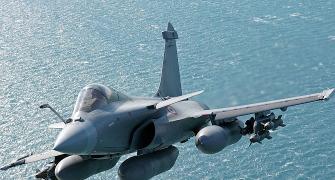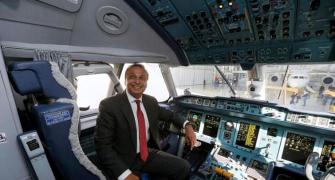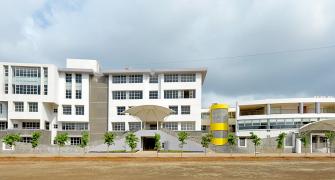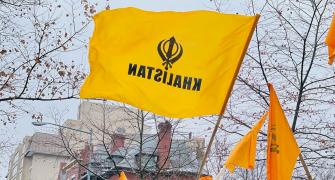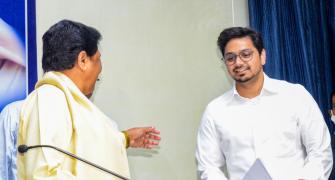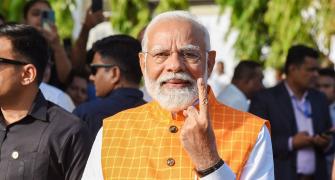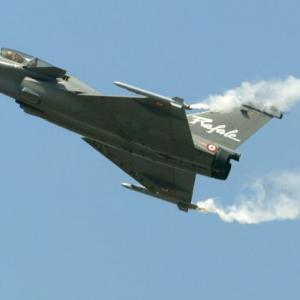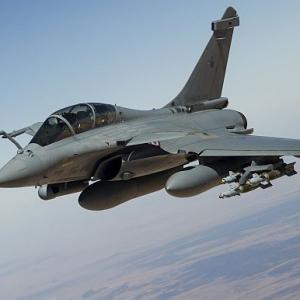The attorney general admitted that there is no sovereign guarantee, but asserted that there is a letter of comfort by France which would be as good as a governmental guarantee.
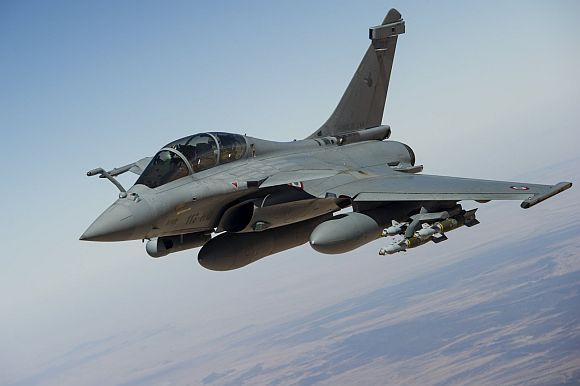
The Supreme Court said pricing details of Rafale jets could only be discussed after it decides on whether to make it public, and reserved its order on Wednesday on pleas seeking court-monitored probe in the multi-billion deal amidst the government's vehement opposition to the public disclosure.
The observation by apex court bench, headed by Chief Justice Ranjan Gogoi, came after the government refused to publicly divulge pricing details of the deal, saying it would give advantage to India's enemies.
Had Rafale fighter jets been used during the Kargil war in 1999, the number of casualties would have been less, the Centre told the Supreme Court while justifying the acquisition of 36 Rafale fighter jets.
"Soldiers lost their lives in the Kargil war. Had Rafale been used during the war, it could have hit the hilltops from 60 kilometers away," Attorney General Venugopal told the bench.
The CJI then said, "Mr Attorney, Kargil was in 1999-2000? Rafale came in 2014."
Venugopal laughed and said, "I meant hypothetically, if Rafale would have been there during the Kargil war."
Hearing a bunch of pleas alleging criminality in Rafale deal and seeking court-monitored probe into it, the apex court asked wide-ranging questions from the government on issues including lack of sovereign guarantee from the French government, selection of Indian offset partner by the Dassault Aviation and need of entering into Inter-Governmental Agreement with France.
The three-judge bench took note of submissions and counter arguments on pricing of the fighter jets with the petitioners alleging that the government has been giving ‘bogus arguments’ and ‘hiding behind the secrecy clause’.
"The decision we need to take is whether to bring the fact on pricing in public domain or not," said the bench, which also comprised justices S K Kaul and K M Joseph.
Vehemently defending non-disclosure of price publicly, Attorney General K K Venugopal said the cost of a bare Rafale jet as per 2016 exchange rate was Rs 670 crore and the disclosure of price of a ‘fully loaded’ aircraft would give an ‘advantage to the adversaries’.
“If cost of a fully loaded aircraft with weaponry and avionics will be disclosed, our adversaries would be able to know what is the nature of avionics and weapons fitted in it,” he said, adding, that India cannot renegade on agreement with France to disclose confidential information about specifics on avionics and weaponry.
"I decided not to peruse it (pricing details) myself as in a case of any leak, my office would be held responsible," he said.
Countering petitioners’ argument that Parliament has been given pricing twice, Venugopal said, "We have been saying that even Parliament has not been told about the complete cost of the jets."
Petitioner lawyer Prashant Bhushan claimed the Union Law Ministry had red-flagged two issues -- absence of sovereign guarantee by France and international arbitration clause in IGA as per which the arbitration seat would be at Geneva -- but the government went ahead with the deal.
Venugopal admitted that there was no sovereign guarantee, but said that France has given a 'letter of comfort' which would be good enough as a governmental guarantee.
He also said issues like types of aircraft and weapons needed to be bought cannot be adjudicated by a court as these were the matters to be decided by experts.
During the four-hour long hearing, the bench told Venugopal the court would want to interact with the Indian Air Force (IAF) officers instead of the Defence Ministry officials to know about the requirement of the IAF.
"We are dealing with the requirements of the Air Force and would like to ask an Air Force officer about their requirements. We want to hear from an Air force officer and not the official of the Defence Ministry on the issue," the bench said after the AG informed it that additional secretary of defence ministry was present in the court.
Later, senior IAF official Air Vice-Marshal J Chalapati, along with other top officers including Air Marshal Anil Khosla and Deputy Chief of Air staff, Air Marshal V R Chaudhari appeared in the court and the CJI interacted with Chalapati over the requirements of the IAF.
During the hearing, Justice Joseph referred to the 2007 Request for Proposal (RFP) for procurement of 126 Rafale jets and observed, "The RFP was scrapped in June 2015. Then how can you (government) claim that the due process laid down earlier was followed?"
The CJI also asked Venugopal, "Is the fresh RFP required in an inter-governmental agreement for the 36 jets?"
To this, he said an IGA does not require fresh RFP.
The court then asked whether the new 36 jets were same as the bare planes which were sought to be procured in 2007.
"Yes", said Venugopal and added that ‘deliverables’ are much better this time due to the time gap and improvement in technology.
He also said that even in 2007, pricing of weaponry and avionics were not made public as claimed by the petitioners.
On the issue of offset partner, the bench asked the additional defence secretary, "What happens to the country's interests if the Indian offset partner chosen is not good enough and not able to make good the contract? What was the need to amend offset guidelines with retrospective effect?"
Responding to the query, the official said if selection of offset partner is not valid, then Dassault would run the risk of the government not accepting its decision on the offset partner and a penalty can also be imposed.
Bhushan, appearing on behalf of himself and former Union ministers Yashwant Sinha and Arun Shourie, alleged that the government was hiding behind the secrecy clause.
Advocates M L Sharma, Vineet Dhanda and Dheeraj Singh, counsel for Aam Aadmi Party MP Sanjay Singh, who also have filed petitions in the case, also advanced their arguments.
India signed an agreement with France for the purchase of 36 Rafale fighter aircraft in a fly-away condition as part of the upgrading process of Indian Air Force equipment. The estimated cost of the deal is Rs 58,000 crore.
The Rafale fighter is a twin-engine Medium Multi Role Combat Aircraft (MMRCA) manufactured by French aerospace company Dassault Aviation.
IAF officers emphasise the need for 4th, 5th generation jets
IAF officers emphasised in the Supreme Court the need for induction of ‘four plus or fifth’ generation fighter aircraft like Rafale, which have niche stealth technology and enhanced electronic warfare capabilities.
They told the bench that Sukhoi 30s is the latest to be inducted which is a 3.5 generation aircraft and said the IAF does not have fourth or fifth generation aircraft.
Air Vice-Marshal Chalapati answered all the questions asked by the CJI about the induction of fighter jets by India.
He said the country needs the fifth generation aircraft, which have niche stealth technology and enhanced electronic warfare capabilities.
The CJI asked him, "What is the latest induction to IAF?"
Air Vice-Marshal Chalapati replied that it is Sukhoi Su-30MKI, manufactured by Hindustan Aeronautics Limited at Nashik in Maharashtra and Bangalore in Karnataka.
He said that IAF is getting new Su-30MKI aircraft each year.
The CJI then asked that besides Su-30MKI, which aircraft are being manufactured in India.
The officer said that he himself is a pilot and has special liking for Light Combat Aircraft (LCA) being built in Bangalore but is yet to be inducted into IAF.
The CJI also asked the officer which generation aircraft are the LCA and Su-30MKI.
Air Vice-Marshal Chalapati said there is no clear definition of generation and as he has flied the LCA which according to him is three and half generation aircraft.
He said both LCA and Su-30MKI are three and half and fourth generation aircrafts respectively but the requirement of IAF at present is of four plus or fifth generations aircrafts.
The CJI asked does it mean that IAF currently requires few squadrons of fourth and fifth generation aircraft.
Air Vice-Marshal Chalapati replied in affirmative and said, "The fifth generation aircraft have niche stealth technology and the electronic warfare capabilities are very very enhanced".
The CJI Gogoi then asked the Air Vice-Marshal was there any induction made in IAF after Mirage in 1985.
The officer replied in negative which led CJI to observe: "It means since 1985 to 2018 there is zero induction".
The CJI said it is all that they wanted to know from the officials and later asked them to go back to their offices after nearly half an hour saying, "Air Marshals can now leave. This is a different kind of war room and you all can go to your war rooms. Thank You".
Hearing sees trading of charges between govt, petitioners
Charges and counter charges flew thick and fast during the high-voltage hearing.
The proceedings saw trading of charges between the Centre and the petitioners, who questioned the authority of the PM in inking the pact with France to import Rafale fighter jets.
Bhushan alleged that there was a ‘gross violation"’ of procedure in the deal which warranted a Central Bureau of Investigation probe.
Questioning the inking of Inter-Governmental Agreement (IGA) between India and France for purchase of 36 Rafale jets, Bhushan claimed it was done only to circumvent the mandatory requirement of issuing tenders for defence procurement under the RFP.
Venugopal vehemently opposed the submissions and denied any violation in the deal.
He also raised serious objection to Bhushan's arguments on secrecy pact between India and France saying, "Secrecy agreement has to be secret and how is he producing it in court?"
To this, the CJI told Bhushan, "We are giving you full hearing. Use this opportunity carefully and cite only those things which are necessary."
"The matter of 36 Rafale planes had never gone to the Indian Air Force (IAF). Now, they have issued tenders for 110 more planes. Who took the decision to procure 36 jets instead of 126 (as required by the IAF)? How the Prime Minister announced it? He has no authority to say or decide this," Bhushan claimed before the bench.
Bhushan claimed that IGA could be entered into only if an equipment of proven technology was identified by forces in joint exercises, large value weapon platform was available at a much lesser price and the original equipment manufacturer was facing an embargo on sale.
"None of the three conditions were satisfied in this deal," he alleged and referred to the two issues flagged by the Law Ministry -- absence of sovereign guarantee by France and international arbitration clause in the IGA as per which the arbitration seat would be at Geneva.
Shourie also addressed the court and claimed that he has perused the details pertaining to the Rafale deal with Dassault Aviation.
He also claimed that former defence minister Manohar Parrikar had earlier said in an interview that 126 Rafale jets would cost around Rs 90,000 crore and the decision to procure 36 jets was made by the Prime Minister as a result of political discussions between him and the then French President.
He alleged that a Reliance firm, which came into being days before inking of the deal, has been given the contract of being the Indian offset partner of Dassault.


